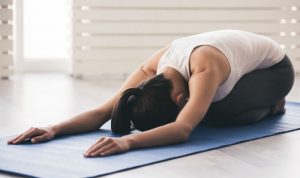Further Improve Depression Treated with Drugs and Counseling with Yoga
By John M. de Castro, Ph.D.
“I feel like the creator of my own reality, rather than the victim of my own circumstance. Yoga has also allowed me to form healthy boundaries and relationships without the highs and the lows.” – Kacey DeGuardia
Depression affects over 6% of the population. Depression can be difficult to treat. It is usually treated with antidepressant medication. But, of patients treated initially with drugs only about a third attained remission of the depression. After repeated and varied treatments including drugs, therapy, exercise etc. only about two thirds of patients attained remission. But drugs often have troubling side effects and can lose effectiveness over time. Being depressed and not responding to treatment or relapsing is a terribly difficult situation. The patients are suffering and nothing appears to work to relieve their intense depression. Suicide becomes a real possibility. So, it is imperative that other treatments be identified that can relieve the suffering.
Mindfulness training is an alternative treatment for depression. It has been shown to be an effective treatment for depression and its recurrence and even in the cases where drugs fail. Another effective alternative treatment is exercise. But it is difficult to get depressed people, who lack energy, to engage in regular exercise. Yoga is a contemplative practice that is both a mindfulness practice and an exercise. It has been shown to be effective in the treatment of depression. So, it makes sense to further study the effectiveness of yoga for depression.
In today’s Research News article “Effect of adjunct yoga therapy in depressive disorders: Findings from a randomized controlled study.” (See summary below or view the full text of the study at: https://www.ncbi.nlm.nih.gov/pmc/articles/PMC6862972/), Kumar and colleagues recruited adult patients diagnosed with depression and randomly assigned them to either receive standard treatment or standard treatment plus yoga therapy. Standard treatment included antidepressant medication and counseling. Yoga therapy sessions included training in breath awareness, postures, and mindful relaxation and occurred 5 times per week for 45 minutes for 4 weeks. They were measured before, during, and after treatment for depression, anxiety, depression severity, and clinical improvement.
They found that in comparison to baseline and the treatment as usual control condition, the group who received yoga therapy had significantly decreased depression, anxiety, and depression severity, and a significant increase in clinical improvement. These results are encouraging and suggest that yoga therapy works to improve depression even in patients continuing to receive drugs and counseling.
Yoga therapy is a complex technique including training in breath awareness, various postures, and mindful relaxation. Future research needs to examine which of these components or combination of components of the yoga therapy program are necessary and sufficient for the improvement. In addition, there’s a need to study the long-term effectiveness of yoga therapy. The results, however, suggest that yoga therapy is safe and effective as an adjunctive treatment for depression producing further improvements.
So, further improve depression treated with drugs and counseling with yoga.
‘That yoga seems to be effective is good news for people struggling with depression. . . . the practice has far fewer side effects and potential drug interactions than mood-altering medications.” – Amanda MacMillan
CMCS – Center for Mindfulness and Contemplative Studies
This and other Contemplative Studies posts are also available on Google+ https://plus.google.com/106784388191201299496/posts and on Twitter @MindfulResearch
Study Summary
Kumar, S., Subramaniam, E., Bhavanani, A. B., Sarkar, S., & Balasundaram, S. (2019). Effect of adjunct yoga therapy in depressive disorders: Findings from a randomized controlled study. Indian journal of psychiatry, 61(6), 592–597. doi:10.4103/psychiatry.IndianJPsychiatry_173_19
Abstract
Background:
Depression causes significant burden both to the individual and to society, and its treatment by antidepressants has various disadvantages. There is preliminary evidence that adds on yoga therapy improves depression by impacting the neurotransmitters involved in the regulation of mood, motivation, and pleasure. Our study aimed to find the effect of adjunctive yoga therapy on outcome of depression and comorbid anxiety.
Materials and Methods:
A randomized controlled study involving patients with major depressive disorder (n = 80) were allocated to two groups, one received standard therapy (antidepressants and counseling) and the other received adjunct yoga therapy along with standard therapy. Ratings of depression and anxiety were done using Montgomery–Asberg Depression Rating Scale and Hospital Anxiety and Depression Scale at baseline, 10th and 30th day. Clinical Global Impression (CGI) Scale was applied at baseline and 30th day to view the severity of illness and clinical improvement.
Results:
By the 30th day, individuals in the yoga group had significantly lower scores of depression, anxiety, and CGI scores, in comparison to the control group. The individuals in the yoga group had a significant fall in depression scores and significant clinical improvement, compared to the control group, from baseline to 30th day and 10th to 30th day. In addition, the individuals in the yoga group had a significant fall in anxiety scores from baseline to 10th day.
Conclusion:
Anxiety starts to improve with short-term yoga sessions, while long-term yoga therapy is likely to be beneficial in the treatment of depression.
https://www.ncbi.nlm.nih.gov/pmc/articles/PMC6862972/
